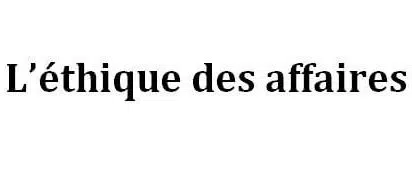In February 2019, several associations published a report (in French): “Year 1: Companies must do better,” on the implementation of the French law on corporate duty of vigilance one year after its entry into force, on 1 January 2018 (1). In a recent article on the subject, Novethic, a media specialised in economics, business & sustainability, pointed out that for the companies concerned, at least a majority of those included in the selection analysed, were “playing for time” (2). In general, according to Novethic, “the spirit of the law [has] been poorly respected.” But what does the “spirit of the law” mean here? The purpose of this paper is to explore the meaning of this expression. We will distinguish five interpretations. ♦ First interpretation: the spirit of the law corresponds to its principle or core idea. This interpretation is given in Novethic’s article, which, under the heading “The spirit of the law poorly respected,” summarises two passages from the report “Year 1: Companies must do better.” Here are the original quotes:
(a) “Our general observation is that the first plans [of vigilance] published in 2018 only partially meet the objectives and requirements of the law, particularly in terms of identifying the risks of violations, their location, and the measures implemented to prevent them.”
The spirit of the law here comes down to “its objectives and requirements,” that is, its raison d’être, principle or central idea. The signatories of the above-mentioned report thus stress that “the application of this law [must] meet its central objective: to prevent violations of fundamental rights and the environment.” The spirit of the law is often opposed to the letter of the law. This opposition is mentioned in the report. It refers, in relation to a particular case, to “a pure exercise of form which does not testify to the taking into account of [the] responsibility of the principal.” And it underlines the necessary continuity of the commitment to the duty of vigilance: “Vigilance must be exercised throughout the year, and not only at the time of the reissue of the plan,” it being understood that the plan may be subject to revisions during the year. In short, interpretation number 1 is based on the importance of thoughtful adherence to an obligation. ♦ Second interpretation: the spirit of the law makes companies aware of their responsibility as principals. A version of this interpretation can be found in an article in Les Echos which reported on an analysis of the first vigilance plans conducted by Ernst & Young (3):
(b) “In writing their document, companies became aware of the need to take into account their entire supply chain, such as the French group that bought glass in China and realized that the glass in question was made from sand imported from Vietnam and from operations that were very destructive to the region’s ecosystems.”
From this argument about the effect of the spirit of the law on the awareness of a moral issue could flow the following corollary: a legal norm has a greater motivational power than a moral norm (4). The report “Year 1: Companies must do better” states this about the garment sector, which has been the subject of a specific review:
(c) “This dramatic event [the collapse of the Rana Plaza in April 2013] demonstrated the urgency of changing the growth model of a sector in which twenty years of soft law and ‘ethical’ commitments could not prevent the worst accident in its history.”
The claim is that voluntary ethical commitments on the part of the companies which initiated the orders would not be sufficient to implement the central idea of the French law on corporate duty of vigilance. Experience shows this inadequacy. This is an almost counter-intuitive statement, as one would expect such commitments to convey precisely a “spirit,” which refers to deliberately adopted principles of action. What is stated in interpretation number 2 of the spirit of the French law on corporate duty of vigilance is the recognition by the company that its liability derives from the obligations defined under French law. ♦ Third interpretation: the spirit of the law means that the companies concerned must care about others and not only about themselves. The report “Year 1: Companies must do better” makes this clear, especially in two passages. The first is part of the general assessment of the first year of implementation of the law:
(d) “[Companies] have often mentioned the risks that possible human rights violations pose to the company and its performance, whereas it is the risks that the company poses to human rights and environmental abuses that should be the subject of these plans.” (5)
The second passage concerns the armaments industry:
(e) “It is time for companies to change their paradigm and understand that the law requires them to analyse the risk not for themselves, but for human rights.”
The following excerpt, from the “Frequently Asked Questions” section about the French law on corporate duty of vigilance, published prior to the above-mentioned report, provides an eloquent version of this interpretation:
(f) “The legal introduction of a human rights duty of vigilance for companies should help to gradually prioritise risks to people and the environment over profits for companies.”
♦ Fourth interpretation: the spirit of the law calls for consideration of the need to change the economic model. The invitation in question is an incentive, not an obligation. The spirit of the law refers here to a desirable situation, or even an ideal. Interpretation number 4 is clearly stated in the report “Year 1: Companies must do better” – statements (e) and (f) above already referred to it. Here is an even more direct reference to companies in the garment sector:
(g) “By not publishing a plan, they are not only violating their legal obligation, but also demonstrating their refusal, beyond cosmetic measures, to take into account their responsibility to develop an industry that they contribute, through their model, to pull down (low-cost production, increase in volumes, collections constantly renewed as a central paradigm).”
♦ Fifth interpretation: the spirit of the law presupposes qualities of character. At the beginning of its general review, the report mentions qualities of character. It is referred to through the word “principles,” either indirectly – “readability,” “accessibility,” “exhaustiveness,” “transparency” are practices that imply virtues such as probity, prudence, ingenuity, perseverance or trustworthiness – or directly through the word “sincerity:”
(h) “[The] design of the [vigilance] plan must be guided by the principles of readability and accessibility on the one hand, and transparency, exhaustiveness and sincerity on the other.”
Conclusion What can we conclude from these five interpretations about the spirit of the French law on corporate duty of vigilance? From a moral point of view, the main conclusion is that each of these interpretations could express or illustrate a normative moral theory. Here is a possible correspondence of the five interpretations with normative theories:
A company will comply with the spirit of the law if
1. it responsibly adheres to an ethical obligation: Deontology
2. it acknowledges its responsibility: Deontology
3. it cares about others: Ethics of care
4. it is ready to review its economic model: Utilitarianism
5. it cultivates qualities of character: Virtue Ethics
The spirit of the French law could be described using moral prescriptions from these normative perspectives. It would then be represented under different descriptions, much like the ethical decision tests that have been proposed in business ethics. For example, in a 1991 article in the Journal of Business Ethics, Gene Laczniak and Patrick Murphy stated a “sequence of [eight] questions to improve ethical reasoning,” which was based on a variety of moral perspectives – including the four indicated above (6). The criticism that can be made of such a conception of the spirit of the French law on corporate duty of vigilance is that the requirements of the normative perspectives may be incompatible. If deontology, utilitarianism, virtue ethics and ethics of care can generate convergent results, i.e. provide the same moral advice to a person faced with a choice, they are based on different axioms and philosophies. And, of course, convergence is not the norm. A second criticism can be made. If the spirit of the law presupposes that moral requirements (those summarised above) are met, then it can be concluded that the activity of companies should also be governed by these requirements. Their conception of ethics should be submitted to them. However, given the moral requirements of the normative theories in question, it is doubtful whether this substantial vision of the spirit of the French law on corporate duty of vigilance can mobilise companies. On the other hand, because of the objectives of the law, it does not seem conceivable that companies should confine themselves solely to compliance with the “letter.” Should we then restrain ourselves to the search for “the inner intelligence of the texts,” in the words of Philippe le Tourneau (7) – an intelligent respect for the letter of the law? Such a search would risk the reduction to a substantial conception of the spirit of the law, such as the one outlined above. The reflection seems to be taken in a circular motion. But it is not a vicious circle. Rather, it is an additional – and disturbing – ingredient of the spirit of the French law on corporate duty of vigilance. Alain Anquetil (1) The full title of the report is (after translation in English): “Act on the duty of vigilance of parent companies and ordering companies– Year 1: companies must do better.” The associations are Les Amis de la Terre France, Amnesty International France, CCFD-Terre Solidaire, Collectif Ethique sur l’étiquette, ActionAid France-Peuples Solidaires, Sherpa. See also this report in English: “French Corporate Duty of Vigilance Law. Frequently Asked Questions.” (2) “Devoir de vigilance : les entreprises jouent la montre,” 25 March 2019. On this expression, see my recent article: “What is paradoxical about “playing for time?” (3) “Devoir de vigilance des entreprises : un premier bilan en demi-teinte,” Les Échos, 27 September 2018, and (again in French) “Loi sur le devoir de vigilance : analyse des premiers plans de vigilance par EY, ” 1 September 2018. (4) I am not discussing here the logical link between the two proposals, which leads me to qualify the second as a corollary of the first. (5) Note this passage on materiality matrix, a widely used tool in CSR: “For more than two thirds of the vigilance plans studied, methodologies related to risk identification are insufficient or even non-existent. For many companies, the hierarchy of issues is developed using a materiality matrix, i.e. according to the expectations of stakeholders and the importance of these issues for the company’s performance.” (6) G. R. Laczniak and P. E. Murphy, “Fostering ethical marketing decisions,” Journal of Business Ethics, 10(4), 1991, pp. 259-271. (7) P. le Tourneau, L’éthique des affaires et du management au XXIe siècle, Editions Dalloz – Sirey, 2000. [cite]




